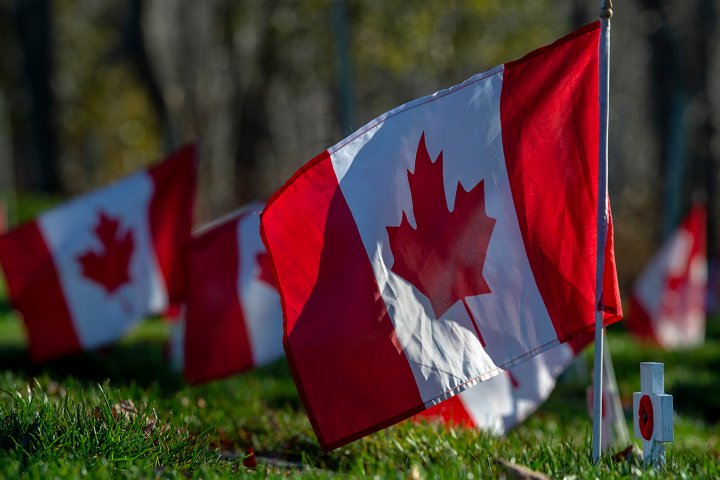
The federal government is launching a “full and thorough” investigation into the case of a Veterans Affairs Canada (VAC) employee discussing medical assistance in dying (MAiD) with a veteran.
In a statement provided to Global News on Friday afternoon, a spokesperson for Veterans Affairs Minister Lawrence MacAulay said that the minister “has directed his Deputy Minister to undertake a full and thorough investigation into this matter.”
MacAulay is also ordering that, “all front line staff at Veterans Affairs Canada are given formal training, direction, and advice on how to approach issues around MAiD,” the statement added.
The investigation and training come after Global News first reported on Aug. 16 that a Veterans Affairs Canada (VAC) employee had discussed medically-assisted dying with a veteran, a case that veterans’ advocates said made clear the stark stakes of the ongoing struggle for veterans to access supports.
Sources told Global News a VAC service agent brought up MAiD unprompted in a conversation with the combat veteran, who was seeking treatment for post-traumatic stress disorder and a traumatic brain injury.
Global News is not identifying the veteran who was seeking treatment due to privacy concerns but has spoken directly with the individual, who says the service agent brought up MAiD repeatedly and even after the veteran asked the service agent to stop.
The veteran said he felt pressured as a result.
He also said that the service agent told him in the call about having helped another veteran access resources for medical assistance in dying through Veterans Affairs Canada, including support for that person’s children who were struggling with the impending death.
The veteran told Global News that service agent told him that the other veteran went through with a medically-assisted death, and that it had been someone who was determined to end his life.
“Better than blowing his brains out all over the wall or driving his car into something,” the veteran says the service agent told him when describing that separate case.
Veterans Affairs Canada said earlier this week it was looking into the matter.
The department and its staff do not have the ability to provide the resources for an assisted death, but veterans advocates have raised serious concerns about the impact of even raising the subject.

“It’s kind of like planting a seed,” said Debbie Lowther, executive director of VETS Canada, a charity that helps veterans in crisis.
“If we have a veteran who’s already struggling with their mental health and maybe they are contemplating suicide … this is an opportunity that’s been presented to them.”
For some, the thought of taking their own life and having a loved one find their body may have been a deterrent to going through with suicidal thoughts, she explained.
But presenting the option to have a medically-assisted death instead, Lowther said, “could have very, very damaging consequences.”
Read more: Veterans Affairs says worker ‘inappropriately’ discussed medically assisted death with veteran
Bruce Moncur, founder of the Afghanistan Veterans Association of Canada, raised similar concerns.
“If that veteran was close to the edge, that might have been the hair that broke the camel’s back,” he said in an interview. “It’s so cavalier with somebody’s life.”
Moncur fought in Afghanistan as a reservist and sustained a traumatic brain injury after being shot in the head while deployed. He said learning of the service agent bringing up medical assistance in dying to a veteran left him feeling “shock, outrage, anger.”
“My understanding [is] this staff is still on the payroll and still working at their job, which is unacceptable to me. I just cannot understand how this person can still be trusted,” he said.
“I’m wondering, is this my case manager? Is this somebody that I have trying to look after me?“
Moncur, whose partner is NDP MP Niki Ashton, also criticized MacAulay’s performance in the job.
He said he sits on the Service Excellence Advisory Group, which advises the minister, and tried to call an emergency meeting about the matter.
“They denied my request,” Moncur said. “They said that we were going to have a meeting in September anyway, so might as well just wait until then.“
Read more: Assisted dying incident puts Veterans Affairs’ mental health supports in doubt: advocates
Global News sent a list of detailed questions about the specifics of the allegations made by the veteran to officials at Veterans Affairs Canada. In response, the department stated they do not record phone conversations between veterans and staff in order to protect privacy.
The department said it could not corroborate the allegations made by the veteran that the service agent had described helping a separate veteran access medical assistance in dying, or about the veteran’s claim that the agent told the separate veteran that MAiD was “better than blowing his brains out.”
The veteran who spoke with Global News has said he filed multiple complaints about the service agent since July 21, 2022.
“When the Veteran client called VAC to share what happened on the call, we immediately took action to address the situation and apologized to the client,” a spokesperson for Veterans Affairs Canada said.
“As directed by the Minister of Veterans Affairs, the Deputy Minister will oversee a thorough internal investigation into this matter and take any appropriate administrative actions necessary to ensure this situation doesn’t happen again.”
“In addition, all VAC frontline staff will be provided training as a reminder of the expectations and the available programs and services offered by the Department to support the health and well-being of Veterans.”
Under Canadian law, medically-assisted death can only be discussed between a primary care provider like a physician or psychiatrist and their patient.
© 2022 Global News, a division of Corus Entertainment Inc.
